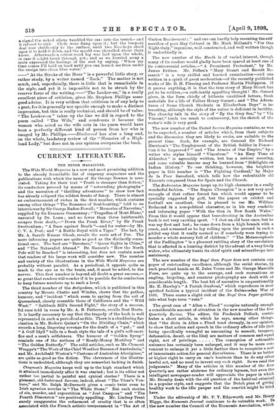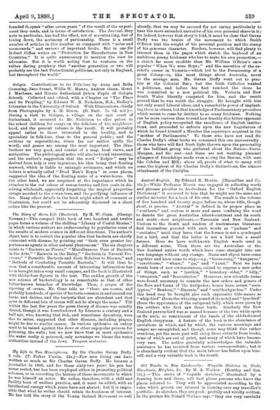CURRENT LITERAT URE.
THE MINOR MAGAZINES.
The Wide World Magazine is a new and most promising addition to the already formidable list of sixpenny magazines and the publications with which the name of Sir George Newnes is asso- ciated. Taking for their text "Truth is stranger than fiction," its conductors proceed by means of "astounding photographs" and the narration of "thrilling adventures" to show how fact has already eclipsed the wildest freaks of fancy. There is almost an embarrassment of riches in the first number, which contains among other things "The Romance of Seal-hunting," told to an interviewer by Sir George Baden-Powell; "Memories of Navarino," supplied by Sir Erasmus Ommanney ; "Tragedies of Mont Blanc," narrated by Dr. Lunn ; and no fewer than three hairbreadth escapee from death,—" Down the Perak River," by Sir Frank Swettenham ; "A Race against Death "—and for water—by Mr. C. V. A. Peel; and "A Battle Royal with a Tiger." The last, by Mr. A. Sarath Kumar Ghosh, recalls the eerie art of Poe. The more informing papers are quite as good as the distinctly sensa- tional ones. The best are "Devotees," "Queer Sights in China," and "The Naturalist Abroad." Dr. Nansen's "How the North Pole will be Reached" is interesting, but does not contain much that readers of his large work will consider new. The number and variety of the illustrations in the Wide World Magazine are probably without parallel. As a periodical, it appeals quite as much to the eye as to the brain, and, it must be added, to the nerves. This first number is beyond all doubt a great success,— so great that readers will wonder if it be possible for its conductors to keep future numbers up to such a level.
The third number of the Antipodean, which is published in this country by Messrs. Chatto and Winans, shows that the pathos, humour, and " incident " which seem to spring from the soil of Queensland, closely resemble those of California and the "Wild West." " Saltbush Bill's Second Fight," the story of a success.. ful ruse told in verse by Mr. A. B. Patterson, recalls Bret Harte. It is hardly necessary to say that the tragedy of the bush is well represented in such a periodical as this. There is a shuddering fas- cination in Mr. Roderic Quinn's "On the Dividing Chain," which records a long, lingering revenge for the death of a " pal ; " and "A Gulf Idyll" tells in a fresh style the tale of a girl's self-sacri- fice and a man's selfishness. The humour of "Golden Syrup" reminds one of the authors of "Ready-Money Mortiboy " and "The Golden Butterfly." The solid articles, such as Mr. Clement Wragge's "The Work of the Chief Weather Bureau of Australasia," and Mr. Archibald Weston's "Customs of Australian Aborigines," are quite as good as the fiction. The cleverness of the illustra- tions is undoubted, although they are somewhat lacking in finish.
Chapman's Magazine keeps well up to the high standard which it attained immediately after it was started ; but is its editor not rather too partial to painful and cynical stories ? There is a pleasant, old-fashioned flavour, indeed, about "The Vicar's Ven- ture," and Mr. Ralph McDermott gives a comic twist even to Irish agrarian murder in "The White Stone." But such stories of sin, murder, and superstition as "Jose Camposa" and "The Fourth Dimension" are positively appalling. Mr. Lindsay Trent surely exaggerates the refinement of cruelty that is so often associated with the French artistic temperament in "The Art of
Gaston Remiremont ; " and ono can hardly help resenting the self sacrifice of poor May Cotterel in Mr. Mark Holland's "For One Night Only," ingenious, well constructed, and well written though it undoubtedly is.
The new number of the Month is of varied interest, though many of its readers would gladly have been spared at least one of its controversial articles,—" A Prominent Protestant," by Mr. James Britten. Mr. Pollen's "Mary Stuart and Recent Re- search" is a very skilful and learned examination—and one written in a spirit of great moderation—of the recently published works of Mr. D. H. Fleming and Professor Martin Philippson. If it proves anything, it is that the true story of Mary Stuart has yet to be written,—a sufficiently appalling thought ! Mr. Gerard gives, in the form chiefly of hitherto unutilised letters, fresh materials for a life of Father Henry Garnet ; and "The Adven- tures cf Some Church Students in Elizabethan Days" is in- teresting, although the style of the writer is deficient in lucidity. The churchy talk in the story of "By the Grey Sea," by "Viii Vincent," tends too much to controversy, but the sketch of the rector's wife is very good.
The new number of the United Service Magazine contains, as was to be expected, a number of articles which, from their subjeets and the discussion they are likely to evoke, are suitable to the present time. Such, for example, are General Sir Richard Harrison's "The Employment of the British Soldier in Peace— Can it be Improved ? " and "The Armies of Our Empire," by a writer who styles himself "Vinculum." "An Easy Time at Aldershot" is agreeably written, but has a serious meaning, and some valuable lessons may be learned from "Sidelights on Indian History." To our thinking, however, the brightest paper in this number is "The Fighting Cardinal," by Major de in Poer Beresford, which tells how the redoubtable old Ximenes conquered Oran for Spain and the Church.
The Badminton Magazine keeps up its high character in a really wonderful fashion. "The Bogus Champion" is a not very good example of that rather forced fun which would appear to be specially suggested by golf, but the papers on cricket and football are excellent. One is pleased to see Mr. William Redmond in a non-political charaeter, as in his very readable and informing paper "With the Gun in New South Wales." From this it would appear that bear-shooting in the Australian bush is not very exciting sport. "I shot an old bear once, but he was my first and last ; he came down from a high branch with a crash, and screamed as he lay rolling upon the ground in such a pitiful way that it really seemed as if somebody were trying to murder a whole nursery full of children." "The Metamorphosis of the Pudlington " is a pleasant rattling story of the revolution that is effected in a hunting district by the advent of a very lively widow, who ultimately hunts its chief spirit and misanthrope into matrimony.
The new number of the Boys' Own Paper does not contain any paper of outstanding excellence, although the serial stories, by such practised hands as M. Jules Verne and Mr. George Manville Fenn, are quite up to the average, and such recreations as angling, bicycling, and amateur photography are dealt with at considerable length. The best bit of narrative is unquestionably Mr. E. Hawley's "A Pariah Gunboat," which reproduces in most spirited fashion a typical incident of the Balmacedan War of 1891. There seems a slight risk of the Boys' Own Paper getting into what boys term "ruts."
The great case of "Allen v. Flood" occupies naturally enough a considerable amount of attention in the new number of the Law Quarterly Review. The editor, Sir Frederick Pollock, contri- butes a short article, in which he says, among other things, that "the dicta in Allen v. Flood tend strongly, in our opinion, to show that action and speech in the ordinary affairs of life (not being specifically wrongful as amounting to assault, trespass defamation, deceit, or the like) are matters of common and equal right, not of privilege The conception of actionable nuisance has certainly been enlarged, and it may be more con- venient to enlarge it yet a little farther than to recognise a sort of innominate action for general disturbance. There is no better or higher right to carry on one's business than to do any other lawful act, and no need to invent any such right. So we read the judgments." Many of the articles in this number of the Law Quarterly are rather abstruse for ordinary laymen, but even the intelligent newspaper-reader will appreciate the paper in which Mr. Bromby deals with the old question of the habitual crimina) in a popular style, and suggests that the Dutch plan of giving healthy work to the idle pauper and the convict might be tried here.
Under the editorship of Mr. F. Y. Edgeworth and Mr. Henry Higgs, the Economic Journal continues to do valuable work. In the new number the Council of the Economic Association, which founded it, speak "after seven years " of the result of the experi- ment they made, and in terms of satisfaction. The Journal, they note in particular, has had the effect, not of accentuating, but of toning down, the acrimony of partisanship. There is a small number of articles in this number as compared with "notes and memoranda" and reviews of important books. But in one Sir Robert Giffen writes on "Protection for Manufactures in New Countries." It is quite unnecessary to mention the view he advocates. But it is worth noting that he ventures on the rather daring prophecy that "another generation or two will probably see the last Protectionist politician, not only in England, but throughout the world."



































 Previous page
Previous page